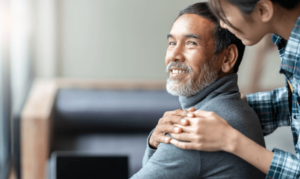What is Social Anxiety Disorder?

Social anxiety disorder (also known as social phobia) is a common mental health condition. It is characterized by an intense fear of entering social situations and being judged, evaluated, or rejected. Individuals with this condition often worry about what people are thinking and how their behavior will be seen by others. This results in withdrawal from social or public activities, along with feelings of fear, panic, or nervousness around others.
However, the good news is that social anxiety can be treated and managed. Below is a brief guide about this condition and how to seek help.
What it Feels Like
Social anxiety disorder can be an all-consuming condition where the mere thought of even going out in public can cause panic or nervousness. For some, social anxiety might feel like stage fright butterflies, but for others, it can feel like an emergency. Some of the most common situations that can trigger someone’s social anxiety include:
- Going out in public
- Social media
- Speaking to strangers
- Attending social engagements
- Entering a room
- Making eye contact
- Eating in front of people
- Going to school or work
It’s important to bear in mind that social anxiety presents differently in each person. What might be triggering for one person may be a breeze to another. However, what characterizes this condition is an ongoing feeling of anxiety when it comes to social situations.
Signs & Symptoms
While the signs differ between each person, there are a few universal symptoms of social anxiety:
- Rapid heartbeat
- Difficulty breathing or tightness in the chest
- Dizziness and light-headedness
- Stomach trouble (nausea, diarrhea, pain)
- Blushing
- De-realization or out-of-body sensations
These symptoms can occur immediately before an event or as early as a few days prior. Depending on the level of a person’s anxiety, the mere thought of social situations can create long-lasting symptoms.
Causes & Life Effects
The exact cause of social anxiety is not known, but current research supports a combination of genetics and environmental factors. Some of the life events that can lead to social anxiety include:
- Bullying
- Abuse (physical, emotional, sexual, mental)
- Family conflict
The effects of social anxiety on one’s life can be mild or drastic, depending on the severity. While some find ways to cope, others may withdraw completely or suffer from panic attacks. The long-term effects of social anxiety can lead to other conditions such as depression, low self-esteem, over-sensitivity, and poor social skills.
How to Seek Help
Thankfully, treatment for social anxiety is readily available and ranges from medication to therapy to life adjustments. Two of the most common forms of treatment are:
- Cognitive-behavioral therapy (CBT): this type of psychotherapy is one of the most effective methods of treating social anxiety. This approach teaches individuals how to change their underlying core beliefs and how they interpret their environment.
- Medications: these include beta-blockers, benzodiazepines, anti-depressants, and other anti-anxiety medications.
Aside from these two treatment protocols, there are other activities you can incorporate into your daily routine. These include:
- Meditation
- Exercise
- Mindfulness exercises
- Reducing caffeine consumption
- Positive affirmations







